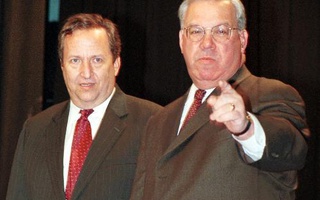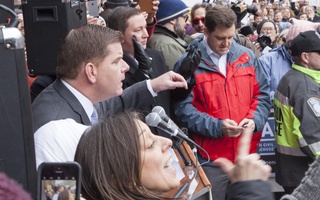Boston Mayor Thomas M. Menino announced on Tuesday the formation of a task force intended to reexamine the amount of voluntary payments made by universities and other non-profit institutions to the city.
Because non-profits are exempt from paying property taxes, their financial contributions to the city—known as payments in lieu of taxes, or PILOTs—are voluntarily negotiated, and as a result, lack standardized guidelines.
According to the Boston Globe, Harvard currently pays $1.9 million a year to the city. Boston University, which owns half as much land as Harvard, pays $4.6 million—over half of the city’s $8.1 million collected from higher education PILOTs. The city collects $32.4 million annually from PILOTs—a small sum compared to the estimated $350 million that Boston would receive if non-profits were not tax-exempt.
The magnitude of this difference becomes even more evident in the current economic climate—the Boston Municipal Research Bureau predicted that Boston could start off the next fiscal year—which begins in July—with an $85 million budget shortfall.
“The city needs all the revenue it can get right now,” said Jessica Shumaker, a spokeswoman for the Boston Redevelopment Authority, the agency responsible for development projects in the city. “I think [the mayor] is examining any way that more revenue can be brought in, whether it’s by bringing new projects online so they can add to the tax base, or by examining what institutions are paying what.”
But other officials said they questioned the efficacy of such a task force and even Menino’s intentions, noting that the city council had examined such a task force and even Menino’s intentions, noting that the city council had examined such issues of “fair” payment distribution in the past without the mayor’s help.
Michael Flaherty, a Boston city councillor at-large who is rumored to be weighing a bid against Menino in next year’s mayoral election, criticized the timing of the move.
“Why didn’t the mayor call for this study when colleges and universities were on better financial standing?” Jon Romano, a Flaherty spokesman, wrote in an e-mailed statement. “Perhaps if we had done this work before, our city—and its budget—would be better prepared to endure the current economic downturn.”
Romano further surmised that the task force’s work would be shrouded in mystery, and that regardless, PILOTs would not provide financial salvation from the city’s current economic straits.
“I look forward to hearing the findings of the Task Force, should they ever come to the surface,” Ramano wrote. “But one thing is for sure, PILOTs, whether they are better negotiated or not, will remain voluntary and will therefore, never be a reliable rescue when the city needs a bailout.”
But others remained more neutral towards the mayor’s move. Harvard’s director of community relations for Boston Kevin A. McCluskey ’76, said it was important to look at the mayor’s intentions from a larger perspective, noting that Harvard and Boston have maintained a long and productive relationship, with Harvard helping the city improve public education and housing.
“What the mayor is looking to do is to broaden and deepen the relationship with the colleges and universities, and other non-profit organizations within the city,” McCluskey said.
“I think that clearly the formation of the task force is his way of calling these organizations to the table to discuss how those relationships can be broadened and deepened,” he said.
—Staff writer Peter F. Zhu can be reached at pzhu@fas.harvard.edu.
Read more in News
Grant Foundation Hit in Madoff SchemeRecommended Articles
-
New Mayors Are Politicians FirstAlthough two women mayors were at the seminar, no black mayors attended. A spokesman for the Institute said yesterday that
-
Yoon To Challenge MeninoAmerica saw its first Asian American mayor in San Jose, California in 1971, just a year after Kennedy School alum
-
 Former Boston Mayor Thomas Menino Diagnosed With Cancer
Former Boston Mayor Thomas Menino Diagnosed With Cancer -
 Harvard and the Hub
Harvard and the Hub -
 Walsh Elected for Second Mayoral Term
Walsh Elected for Second Mayoral Term













